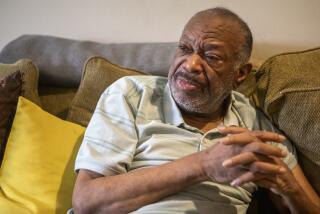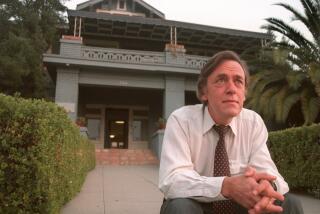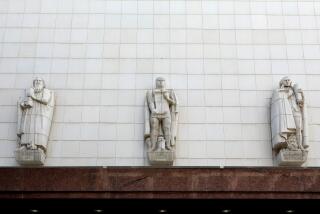Arthur L. Alarcon, 9th U.S. Circuit’s first Latino judge, dies at 89
Arthur L. Alarcon, the first Latino appointed to the 9th U.S. Circuit Court of Appeals, died Wednesday at his Pacific Palisades home. He was 89.
He was recently diagnosed with cancer, according to a court statement.
The native Angeleno and son of a baker was a judge for more than 50 years. He was nominated to the 9th Circuit in 1979 by President Jimmy Carter after serving two decades in high-profile posts at the state and county levels.
Colleagues and friends this week remembered him for his public service and sharp mind — also for his gracious manner.
“He had a keen intellect, a real love of the law and was committed to justice for all,” said U.S. Sen. Dianne Feinstein (D-Calif.), who became a good friend after working with Alarcon decades ago. “I will always remember his booming laugh, which was one of the world’s best.”
Born Aug. 14, 1925, in Los Angeles, Alarcon knew from an early age that he would be a lawyer. His father, a native of Mexico with little formal schooling, was his motivation.
“He told me from the time I was a small child that in this country a law background would be excellent for whatever ultimate [career] choice I made,” Alarcon told the Los Angeles Daily Journal in 1981.
After high school, Alarcon served in the Army during World War II, earning a Bronze Star and a Purple Heart. He nearly lost his legs while serving in France after falling into icy water and being stuck for hours. When the self-described “L.A. surfer who didn’t know a thing about the cold” was finally rescued, the doctor gave him an ounce of bourbon every 12 hours.
“I don’t know if it worked, but I still have my legs,” Alarcon said.
He graduated from the USC Law School in 1951. He prosecuted capital cases as a deputy district attorney in Los Angeles County and served as clemency secretary to Gov. Pat Brown. In his later years, he pushed for an overhaul of the state’s capital punishment system, arguing that the average lag time between conviction and execution was twice the national average.
On the 9th Circuit, Alarcon served as an active judge until taking senior status in 1992. He often filled in on other federal courts across the country and also worked with judges in Latin America under international exchange programs.
“Judge Alarcon was for me the gold standard in judicial excellence,” said Deanne Tacha, a former chief judge of the 10th Circuit Court of Appeals who sat with Alarcon several times.
The longtime judge presided over many noteworthy cases, including that of Sirhan Sirhan, convicted of assassinating Robert F. Kennedy. But he wasn’t one to boast or lecture.
“I hate judges who have a briefcase full of solutions to all life’s problems,” he once told the Journal. “I am, and will be until I’m carried off, a student.”
In a 2006 Los Angeles Times story about the renovation of the old downtown Hall of Justice, Alarcon shared his memories of the building, built the same year he was born.
One of his most notable memories was the 1956 trial of James Merkouris, who had been convicted of killing his former wife and her new husband.
“The judge,” Alarcon said, “threatened to bind and gag Merkouris for screaming obscenities during proceedings.” But before he had the chance, Merkouris grabbed the prosecuting attorney from behind. At that moment, Alarcon sprang from his seat and jumped on Merkouris’ back.
After deputies broke up the brawl, Merkouris spent the rest of the trial strapped in a steel chair bolted to the floor, encased in a soundproof glass booth, so his frequent outbursts wouldn’t disrupt proceedings.
Throughout his career, Alarcon kept busy off the bench, serving on the boards of numerous Latino and youth organizations.
Alarcon “didn’t seem to understand the idea of slowing down,” said Kathryn Lohmeyer, his career law clerk.
In his later years, he was an avid walker and gardener, often charming people with his easy, hearty laugh. He continued to work for some time after he was diagnosed with cancer, never letting colleagues in on his illness.
Alarcon is survived by his wife Sandra Alarcon; sons Los Angeles Superior Court Judge Greg Alarcon and attorney Lance Alarcon; daughter Jan Alarcon, who is a physician; three granddaughters and one great-grandson.
More to Read
Start your day right
Sign up for Essential California for the L.A. Times biggest news, features and recommendations in your inbox six days a week.
You may occasionally receive promotional content from the Los Angeles Times.







